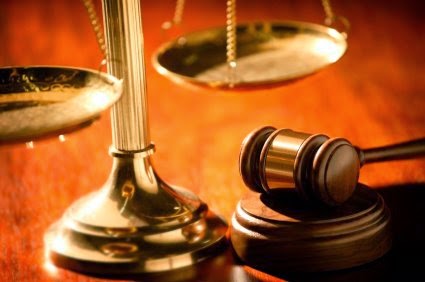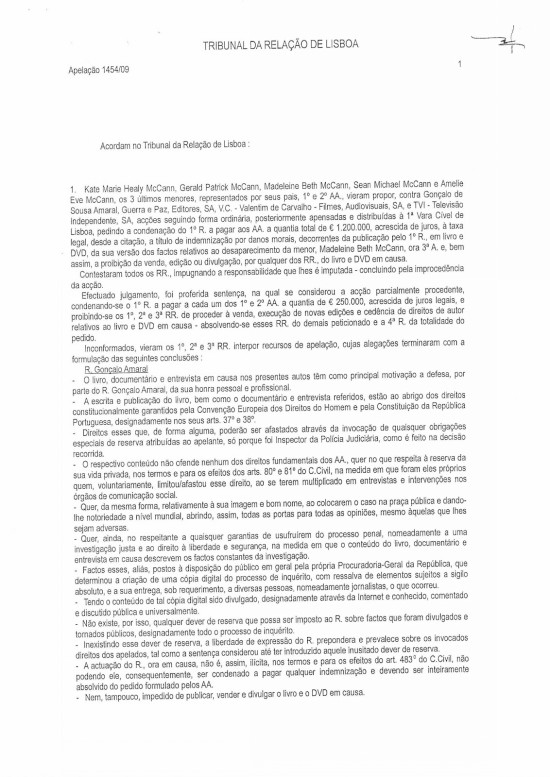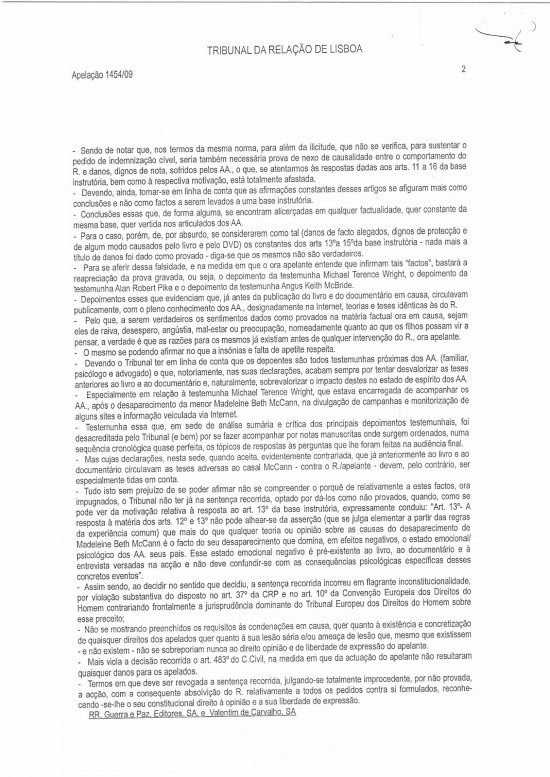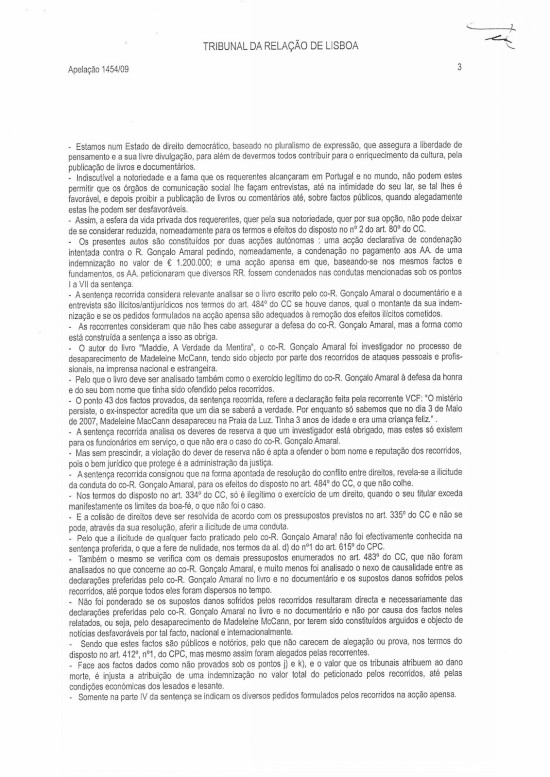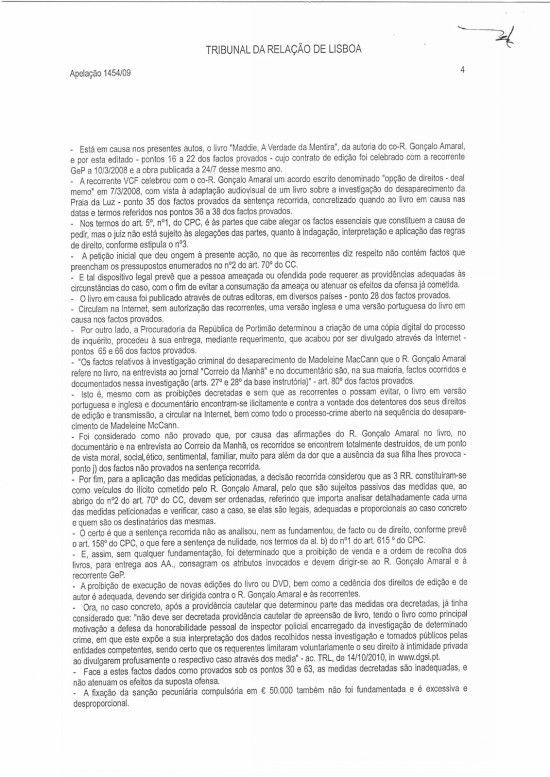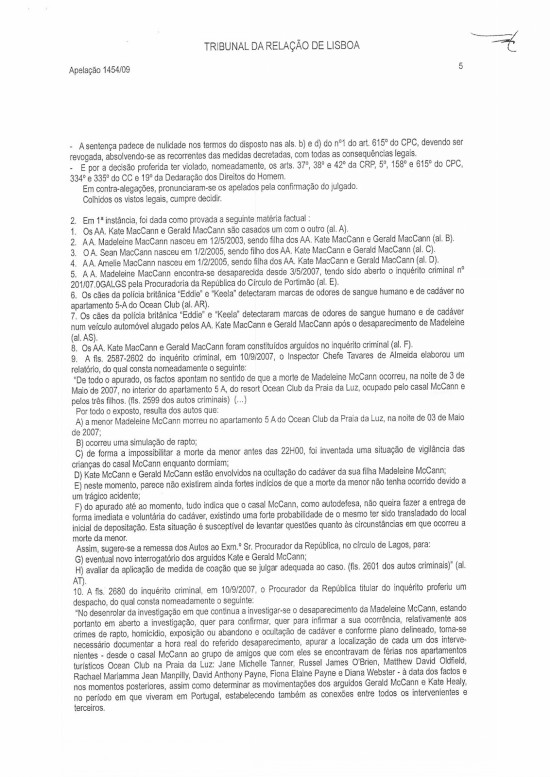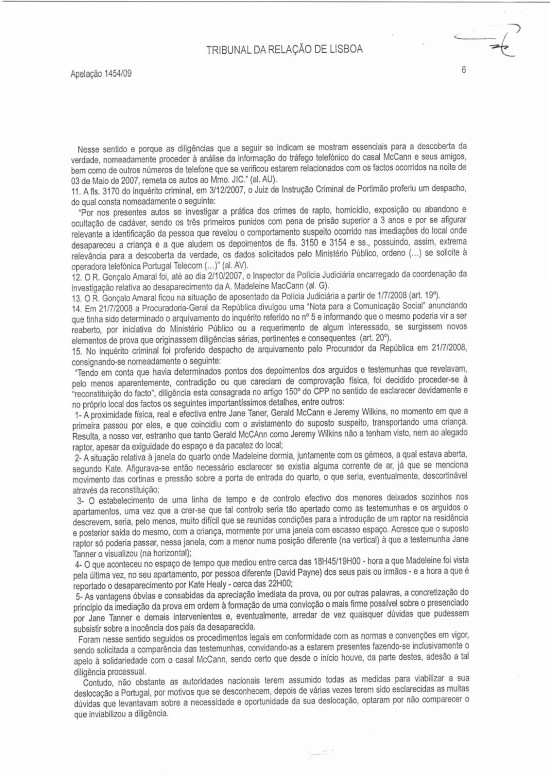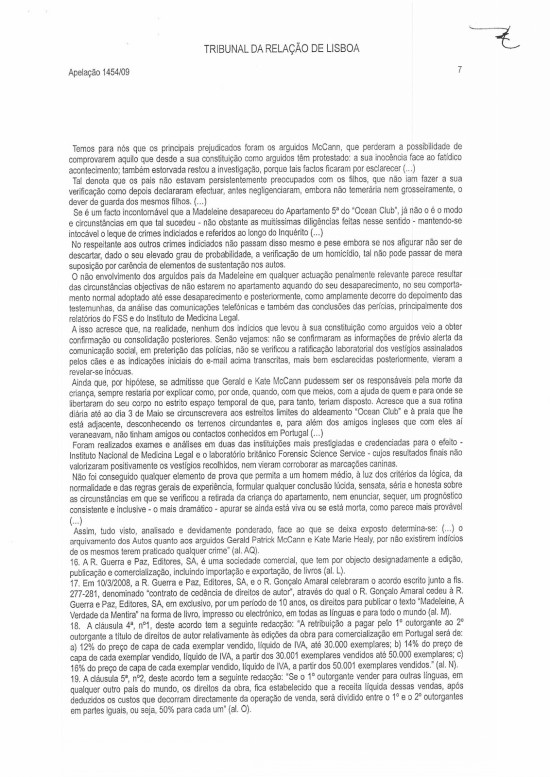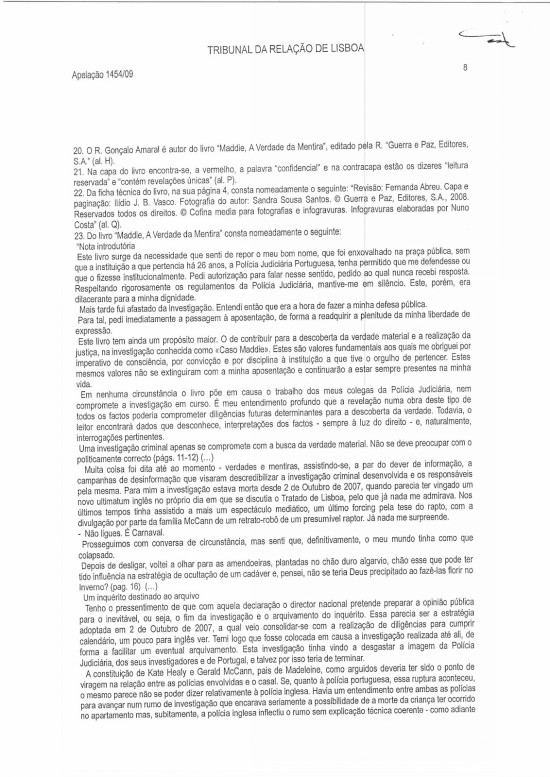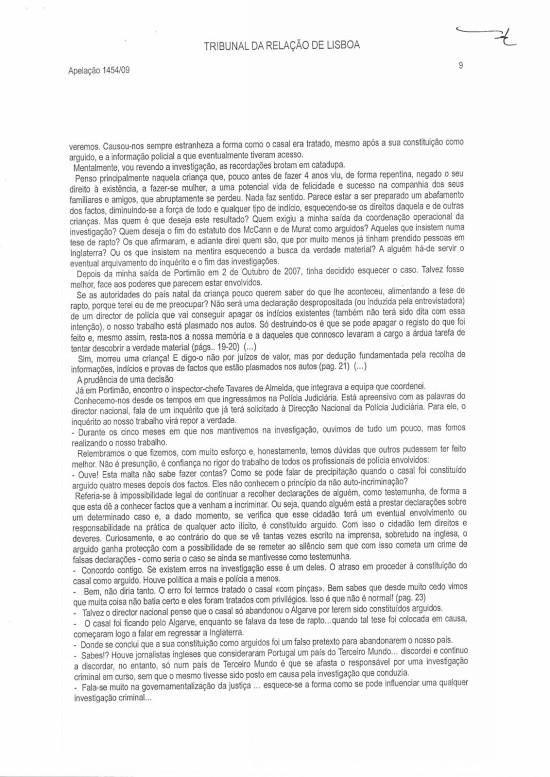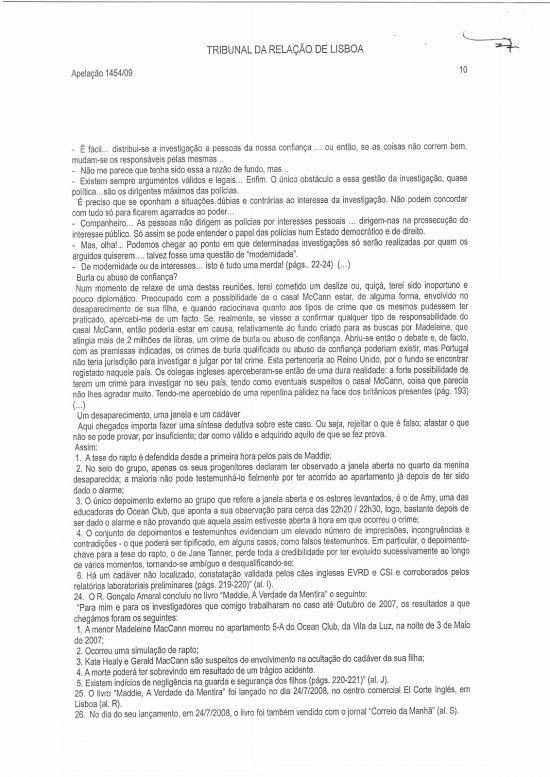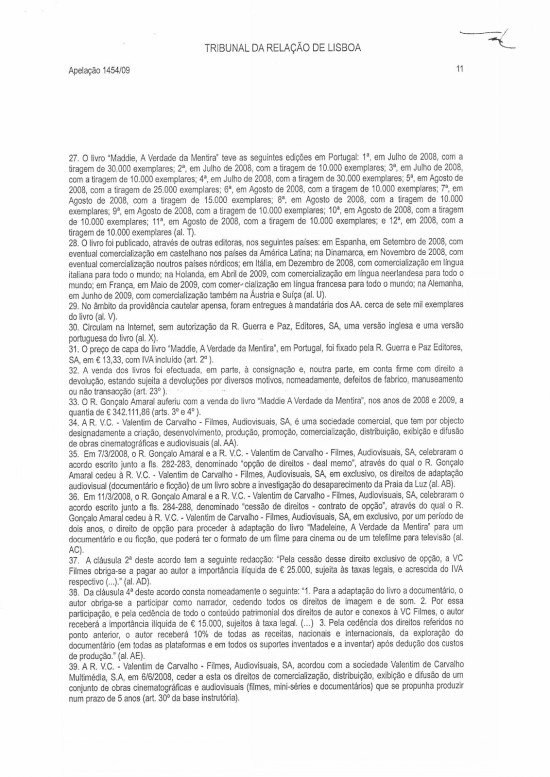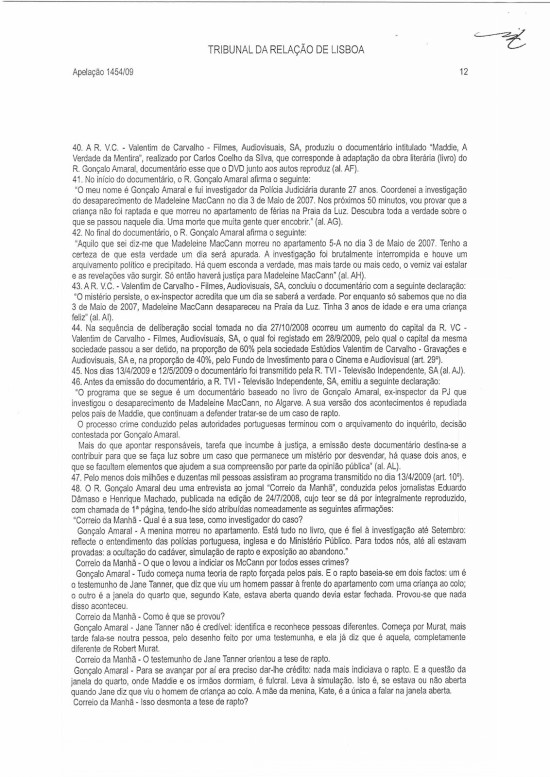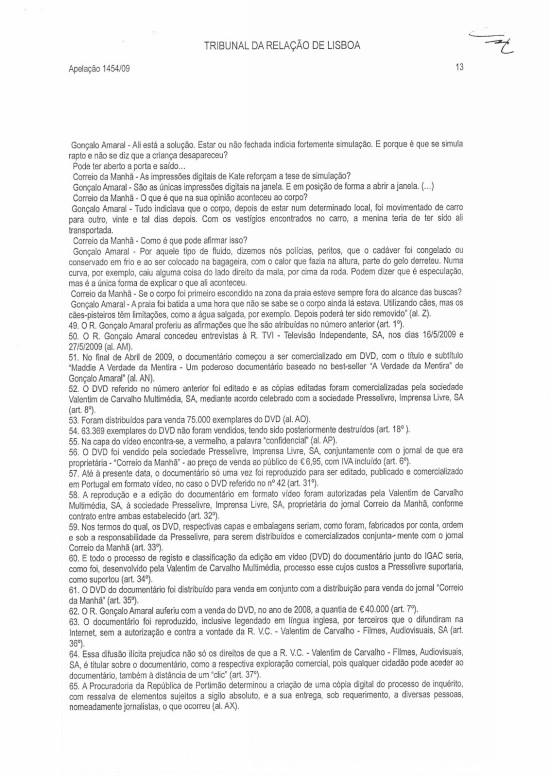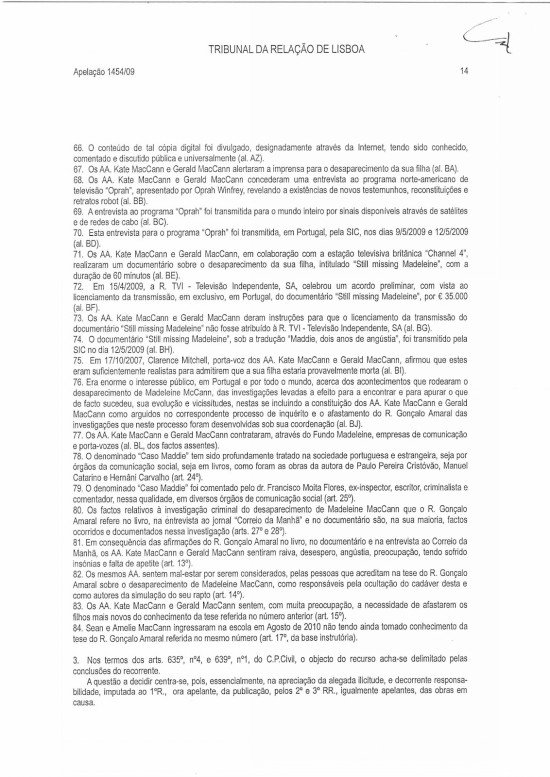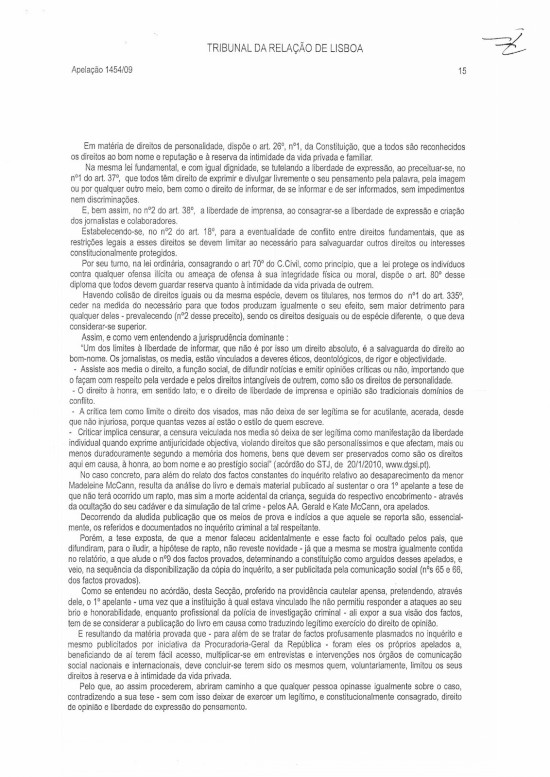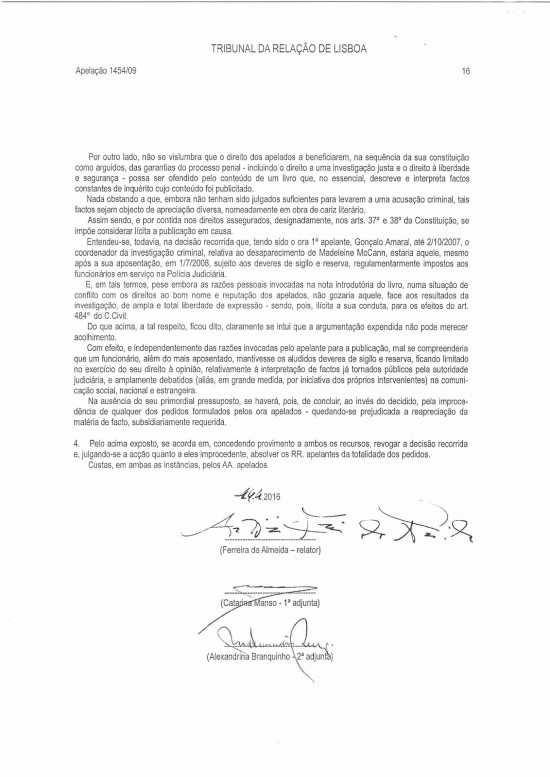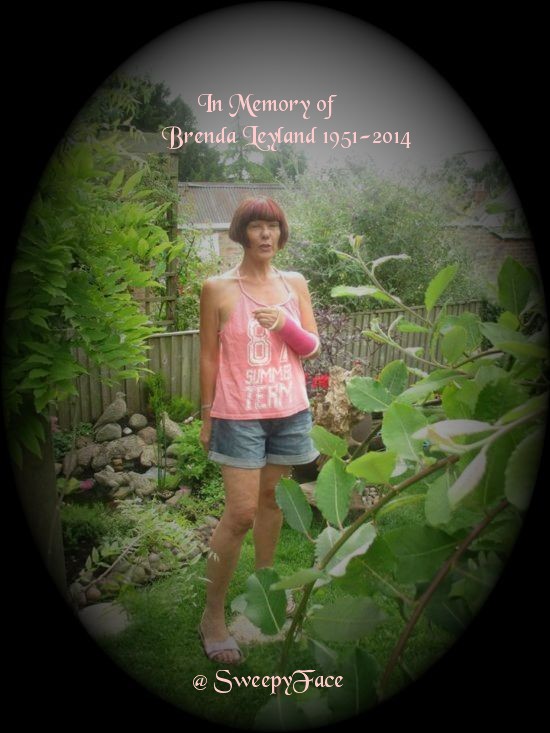|
3. Under articles 635, number 4, and
639, number 1, of the Civil Process
Code, the matter of the appeal is
delimited by the appellant’s
conclusions.
The matter subject to decision is thus
essentially centred on the evaluation of
the alleged wrongfulness and the
responsibility that derives from it,
imputed to the 1st defendant [Gonçalo
Amaral], now the appellant, of the
publication, by the 2nd and the 3rd
defendants, equally appellants, of the
works at stake.
As far as personality rights are
concerned, article 26, number 1, of the
Constitution states that everyone has a
right to a good name and reputation and
to the protection of the intimacy of
private and family life.
The same fundamental law protects, with
equal dignity, freedom of expression, by
stating under number 1 of article 37
that everyone has a right to express and
to publicise their thoughts in words,
image or by any other means, as well as
the right to inform, to inform oneself
and to be informed, without impediment
or discrimination.
And also, under number 2 of article 38,
freedom of press, by consecrating
freedom of expression and of creation by
journalists and their collaborators.
Number 2 of article 18 establishes, in
the case of conflict between fundamental
rights, that any legal restrictions to
those rights must be limited to whatever
is necessary in order to safeguard other
rights or interests that are
constitutionally protected.
On the other hand, in ordinary law,
article 70 of the Civil Code
consecrates, as a principle, that the
law protects individuals against any
illicit offence or threat to offend
their physical or moral integrity, while
article 80 of the same diploma states
that everyone must respect someone
else’s intimacy of private life.
Whenever there is a collision of rights
that are equal or of the same kind, the
holders must, under number 1 of article
335, cede as necessary in order for all
of them to produce their effect equally,
without greater damage for any one of
them – while (under number 2 of the same
article), if the rights are not equal or
are of different species, the one that
is considered superior must prevail.
Therefore, and as the dominant
jurisprudence understands the matter:
“One of the limits to the freedom of
information, which therefore is not an
absolute right, is the safeguard of the
right to a good name. Journalists, the
media, are bound by ethical and
deontological duties, and duties of
rigour and objectivity.
- The media have the right, the social
function, of spreading news and giving
critical or non-critical opinions, and
it is important that they do so with
respect for the truth and for someone
else’s intangible rights, as are
personality rights.
- The right to honour, in a broader
sense, and the right to freedom of press
and of opinion are traditional areas of
conflict.
- Criticism has a boundary in the rights
of its targets, but it remains
legitimate if it is sharp, steely, as
long as it is not injurious, because so
often therein lies the style of the
author.
- To criticise implies to reproach,
fault-finding that is aired in the media
only stops being legitimate as a
manifestation of individual freedom when
it expresses objective antijuricity,
violating rights that are extremely
personal and which effect, in a more or
less lasting manner according to men’s
memory, assets that need to be preserved
as are the rights here at stake, to
honour, to a good name and to a social
standing” (decision by the Superior
Court, dated 20/1/2010, www.dgsi.pt)
In the case at hand, apart from the
reporting of the facts that are part of
the inquiry into the disappearance of
Madeleine McCann, an analysis of the
book and of the rest of the published
material finds that the now 1st
appellant [Gonçalo Amaral] therein
sustains the thesis that an abduction
did not take place, but rather the
accidental death of the child, followed
by a cover-up – through the concealment
of her cadaver and the simulation of
that crime – by plaintiffs Gerald and
Kate McCann, now the subjects of the
appeal.
It results from the aforementioned
publication that the means of evidence
and the indicia that it reports to are,
essentially, those referred to and
documented in the respective criminal
enquiry.
Nevertheless, the exposed thesis, that
the child died accidentally and that
fact was concealed by the parents, who
have broadcast, in order to deceive, the
hypothesis of an abduction, is not new –
the same is equally contained in the
report which is mentioned under number 9
of the proven facts, determining the
arguido constitution of said subjects of
appeal [Kate and Gerry McCann], and was,
after a copy of the inquiry was made
public, published in the media (numbers
65 and 66 of proven facts).
As was stated in the decision, from this
Section, concerning the appended
injunction, the 1st appellant [Gonçalo
Amaral], wanted, through this book –
because the institution to which he was
bound did not allow him to reply to
attacks against his pride and honour, as
a professional of the criminal
investigation police – to expose his
vision of the facts, and therefore the
publication of said book has to be
considered a legitimate exercise of the
right to an opinion.
And because from the proved matter
results that – apart from it being about
facts that have been profusely published
in the inquiry and even publicised
through an initiative of the Republic’s
Prosecutor General’s Office – it was the
subjects of the appeal themselves [Kate
and Gerry McCann] who, benefiting from
an easy access, multiplied themselves in
interviews and interventions in national
and international media, one must
conclude that it was them who,
voluntarily, limited their rights to
reservation and to the intimacy of
private life.
By proceeding in this manner, they
opened the way for anyone to equally
express an opinion about the case,
contradicting their thesis – without
losing their right to exercise a
legitimate, and constitutionally
consecrated, right to an opinion and a
freedom of expression of thought.
On the other hand, we cannot see how the
right of the subjects of this appeal
[Kate and Gerry McCann] to benefit,
following their constitution as
arguidos, from the guarantees of the
penal process – including the right to a
fair investigation and the right to
freedom and safety – may be offended by
the contents of a book which, in its
essence, describes and interprets facts
that are part of an inquiry whose
contents have been published.
Nothing opposes that, although they have
not been deemed sufficient to lead to a
criminal charge, said facts are subject
to diverse appreciation, namely in a
work of literary nature.
Therefore, and because it is contained
within consecrated rights, namely under
numbers 37 and 38 of the Constitution,
the publication at stake must be
considered lawful.
Nonetheless, it is understood, in the
decision under appeal, that because the
1st appellant, Gonçalo Amaral, was,
until October 2, 2007, the coordinator
of the criminal investigation into the
disappearance of Madeleine McCann, he
was, after his retirement on the 1st of
July, 2008, subject to the duties of
secrecy and reserve that are imposed to
the employees that serve the Polícia
Judiciária.
And, under such terms, although the
introductory note in the book invokes
personal reasons, in a situation of
conflict with the rights to a good name
and reputation of the subjects of the
appeal, the appellant [Gonçalo Amaral]
could not benefit, faced with the
results of the investigation, of a broad
and full freedom of expression – and
thus his conduct would be unlawful,
under article 484 of the Civil Code.
From what was above said about this
matter, it is clearly understood that
such argumentation cannot be sustained.
In effect, and independently of the
reasons invoked by the appellant for the
publication, it is hardly understandable
that an employee, even more a retired
one, would have to keep said duties of
secrecy and reserve, thus being limited
in the exercise of his right to an
opinion, concerning the interpretation
of facts that were already made public
by the judiciary authority, and widely
debated (in fact, largely by initiative
of the intervenients themselves) in the
national and international media.
In the absence of its primordial
presupposition it must therefore be
concluded against the previous decision,
due to the lack of precedence of any of
the requests that have been formulated
by the current subjects of the appeal
[Kate and Gerry McCann] – while the
re-appreciation of the matter of fact
that had been secondarily requested
remains impaired.
4. From the above mentioned, it is
agreed, in accordance with both appeals,
to revoke the appealed decision and,
considering the action against them to
be unfounded, to acquit the appealing
plaintiffs of the totality of the
requests. The costs, in both instances
[courts] are to be paid by the appealed
subjects [Kate and Gerry McCann]. |
|
Snippets from the Appeal Court Ruling
translation from Ines |
| |
|
Page 1 of ruling Thanks
to Ines |
|
Source |
|
Snippet from Ruling:
The respective content (of
the book) does not offend
any of the fundamental
rights of the plaintiffs,
neither the respect to the
right of privacy, according
to the terms laid down in
articles 80 and 81 of the
Civil Code, in the sense
that it was they themselves
who, voluntarily,
limited/waived this right,
by having presented
themselves on multiple
occasions for interviews and
social media interventions.
In the same way, with
relation to their image and
good name, by placing the
case in the public domain
and making it famous at
world-wide level, (they)
thereby opened all doors for
all opinions, even those
that were adverse to them.
Page 1 |
| |
|
(Page 1 of ruling) Thanks to
Ines |
|
Source |
|
Snippet from ruling:
Furthermore with respect to
eventual guarantees relating
to the usufruct (right) of
the penal process, namely
the right to a fair
investigation and the right
to liberty and security, in
the sense that the content
of the book, documentary and
interview in question
describe the facts contained
in the investigation.
These facts, in addition,
made available to the
general public by the Public
Prosecutor, who ordered the
creation of an electronic
copy containing the process
of the investigation, with
the exception of elements
subject to secrecy and its
delivery, upon request, to
different persons, mostly
journalists, is what
occurred.
The electronic copy having
been distributed, especially
by means of Internet, became
known, commented upon and
discussed publicly and
universally.
Therefore, no right of
reserve exists that could be
imposed upon the defendant
about facts that were
divulged and made public,
notably the whole
investigative process.
(Page 1) |
| |
|
(Page 2 of Ruling) Thanks to
Ines |
|
Source |
|
Snippet from the Appeal
Court Ruling with regard to
the witness statements made
by Michael Terrence Wright,
Alan Robert Pike and Angus
Keith McBride:
“Witness statements which
show that, already before
the publication of the book
and documentary in question,
there were theories and
theses identical to those of
GA circulating publicly,
mainly on Internet, with the
plaintiffs' full knowledge.
Whilst the feelings given as
proven in the facts were
true, being those of rage,
despair, anguish, unrest or
worry, namely with regard to
what the twins might think,
the truth is that these
reasons already existed
before any intervention on
the part of the defendent.
The same can be said with
regard to the insomnia and
lack of appetite.
The Court being obliged to
take into consideration that
the statements are all made
by witnesses close to the
plaintiffs (family member,
psychologist and lawyer) and
that, notably in their
statements, they always end
up in trying to undermine
the theses previous to the
book and documentary and,
naturally, over-emphasising
the impact of the latter on
the plaintiffs’ state of
mind.
This was the case especially
of the witness Michael
Terence Wright, who was in
charge of the accompanying
the plaintiffs after the
disappearance of MBM, in the
promotion of campaigns and
in the monitoring of sites
and information circulated
on the Internet.
A witness whom, upon
analysis, was discredited by
the Court (and rightly so)
for possessing handwritten
organised notes in an almost
perfect chronological order
containing the topics of the
replies to the questions he
was asked during the final
court session”.
(Page 2 of Ruling) |
| |
|
(Page 3 of ruling) Thanks to
Ines |
|
Source |
|
Snippet from ruling:
“The author of the book
“Maddie: The Truth of the
Lie”, GA was an investigator
in the case of the
disappearance of MBM, having
been the object of personal
and professional attacks by
the plaintiffs, in the
national and foreign press.
That the book be analysed
also as a legitimate
exercise by GA in the
defence of his honour and
good name which had been
offended by the plaintiffs.
Point 43 of the proven
facts, from the appealed
sentence, refers to the
statement made by VCF: “The
mystery persists, the former
inspector thinks that one
day the truth will be known.
In the meantime, we only
know that on 3rd May 2007,
MBM disappeared in Praia da
Luz. She was 3 years old and
she was a happy child”.
The appealed sentence
analyses the duties of
reserve which a police
officer is obliged to
respect, but these duties
only apply to serving
officers, which was not the
case for GA”.
(Page 3) |
| |
|
(Page
2&3 of ruling) Thanks to
Ines |
|
Source |
|
Snippet from Ruling
Regarding:
“Guerra e Paz, Editores SA
and Valentim de Carvalho,
SA.
We live in a State of
democratic right, based upon
pluralism of expression,
which ensures the freedom of
thought and its free
circulation, we should all
contribute to the enrichment
of culture, by means of the
publication of books and
documentaries.
The notoriety and fame
achieved by the plaintiffs
in Portugal and around the
world are undeniable, they
cannot permit that the
social media interview them,
even in the intimacy of
their own home, when it is
favourable to them, and then
subsequently ban the
publication of books or
comments, about publicly
known facts, when allegedly
these could be unfavourable
to them”.
(Page 2-3) |
| |
|
(Page
4 of ruling) Thanks to
Ines |
|
Source |
|
Snippet from Ruling:
The book in question was
published by other
publishers, in different
countries – point 28 of the
proven facts.
The proven facts also show
that unauthorised English
and Portuguese versions of
the book were circulated on
Internet.
On the other hand, the
Portimão Public Prosecutor
authorized the creation of
an electronic copy of the
investigation process and
delivered the copy, upon
request, which ended up
being circulated on
Internet, points 65 and 66
of the proven facts.
The facts relating to the
criminal investigation into
the disappearance of MBM to
which G. Amaral refers in
his book, in the interview
with the newspaper Correio
da Manhã and in the
documentary are, in the
majority, facts that
occurred and which are
documented in the
investigation (articles 27
and 28 of instruction base)
– article 80 of the proven
facts.
Even in spite of the bans
issued and out of the
plaintiffs’ control,
Portuguese and English
versions of the book and
documentary could be found
circulating on Internet
illegally and against the
wishes of those holding the
rights to their edition and
publication, as well as the
full criminal investigation
opened following the
disappearance of MBM.
It was considered as not
proven that, due to the
statements of G.A in the
book, documentary and
Correio da Manhã interview,
the plaintiffs were totally
destroyed, from a moral,
social, ethical, family
point of view, far in excess
of the pain caused to them
by the absence of their
daughter – point j of the
non-proven facts in the
appealed sentence.
(Page 4) |
| |
|
(Page of ruling
Documentary) Thanks to
Ines |
|
Source |
|
"71. Plaintiffs Kate McCann
and Gerry McCann, in
collaboration with the
British television Channel 4
made a 60 minute documentary
about the disappearance of
their daughter, titled
“Still Missing Madeleine”.
72. On 15-4-2009 TVI
(Portuguese TV) signed a
preliminary agreement for
the exclusive broadcasting
rights in Portugal of the
“Sill Missing Madeleine”
documentary at a cost of
35.000 euros.
73. The plaintiffs KM and GM
gave instruction that the
broadcasting rights for the
documentary should not be
attributed to TVI.
74. The “Still Missing
Madeleine” documentary,
under the Portuguese title
“Maddie, dois anos de
angustia” was transmitted by
the SIC TV channel on
12-5-2009. " |
| |
|
|
19 Apr 2016
Apelação 1454/09 |
|
|
|

